Theater Feature: Best Stage Productions of 2019
Our theater critics pick some of the outstanding productions of the year.
By The Arts Fuse Staff
Arts Fuse stage critics have come up with a number of standout productions, and the line-up has the merit of being a pleasingly expansive list, including productions from small, medium, and large companies. Feel free to write in and tell us about your favorites — and why they were so good.
Bill Marx
Editor
The Arts Fuse
Bob Israel
The best stage productions in 2019 invited audiences to experience the theatrical synergy generated by player, sound, lighting, set, costumes, and directors. Here are my top three choices for the best stage shows:
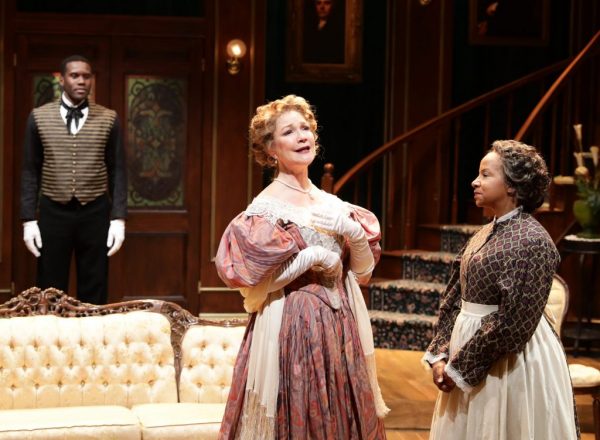
Kinson Theodoris, Amelia Broome, Cheryl D. Singleton in the Lyric Stage production of The Little Foxes. Photo: Mark S. Howard.
The Little Foxes by Lillian Hellman, staged by Lyric Stage Company, Boston. Scott Edmiston directed this blemish-free production starring the sublime Anne Gottlieb as Regina Giddens, who, circa 1900, engages in psychological warfare to reclaim her share of the American dream. Hellman planned to write a trilogy about this pernicious Southern family, but completed only two entries. Her prequel, Another Part of the Forest, hasn’t been performed in Boston in years (read: decades). The Lyric Stage production of Foxes was a critical and financial success. Will someone conscript Edmiston (and cast) to stage the Hellman prequel in 2020?
The Lighthouse by Yukio Mishima, staged by Provincetown Tennessee Williams Theater Festival. Mishima is a major playwright and, like Hellman, his scripts are rarely produced. The PTWTF production showed how much we were missing by staging an English language premiere. This was an outdoor production, the lights of Provincetown harbor standing in for footlights. Benny Sato Ambush’s direction was strong, and the cast members evoked the script’s pressurized collection of raw, taboo longings. The sound of the incoming tide deepened the mood, as darkness fell and the lighthouse off MacMillan Pier signaled to us via indecipherable Morse code.
Indecent by Paula Vogel, staged by Huntington Theater Company, Boston. Under Rebecca Taichman’s insightful direction, the cast was skillfully spectral — until it burst into to life via radiant songs and dances in Yiddish and English. Vogel warns us that the world remains a dangerous place to openly practice one’s faith, but human love can triumph — even in the Holocaust.
Farewell to IRNE
In 2019, the Independent Reviewers of New England (IRNE) called it quits after 23 years. IRNE’s theater critics (myself among them) celebrated the best shows and stage artists by hosting an annual boisterous and irreverent awards soiree in Brookline. IRNE’s demise leaves the New England theater community a much poorer place.
Why Theater Matters
“I think we go to the theater to have our hearts broken. Because it’s the only real evidence we have that we’re human. Once your heart is broken, you’re home free.”
— Fionnula Flanagan, actress in The Ferryman, New York Times, May 9, 2019.
David Greenham
As an Art Fuse reader, you probably were buoyed by the fact that many theater companies around New England seem to have caught up with the times. It’s hard to name a company of note that did not mount a theatrical commentary on these days of distrust, mutual destruction, and daily threat to so many of the laws and beliefs on which our country was built. We are continually reminded that there are cracks in America’s foundation.
New England has always struggled to come to terms with its role in the industry of slavery and the plight of enslaved people. Gloucester Stage and Our Place Theatre provided a necessary examination in their co-production Wrestling With Freedom, written and directed by Jacqui Parker. The script is still in development. It focuses on Phillis Wheatley (Candis Hilton), who lived in Boston and is considered to be the first African American poet of distinction. Among her friends is Obour Tanner (Inés De La Cruz), the servant of a silversmith in Newport, RI, who went on to found the African Female Benevolent Society in the early 19th century. Through her exploration of the relationship between Wheatley and Tanner, Parker explores the complexity of New England’s dark legacy. Wrestling With Freedom has yet to be shaped into a satisfactory dramatic form, but it offers invaluable glimpses of early American history from the point of view of African women, a perspective that is necessary to confront if we are to move forward.
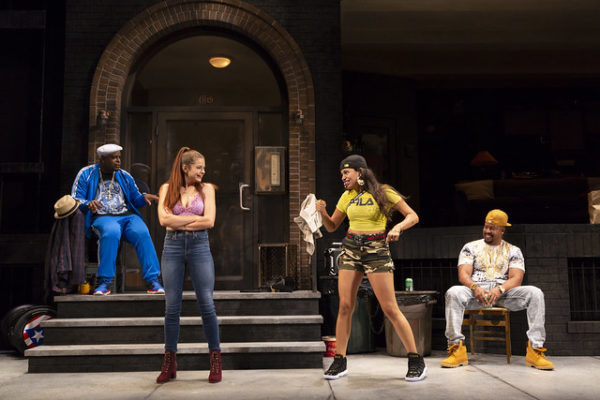
A scene from the Huntington Theatre Company production of The Purists. Photo: T Charles Erickson.
Strong women were also on display in Dan McCabe’s The Purists, produced with great success by The Huntington Theatre Company. Billy Porter’s savvy direction served the script well. From my review: “Tony award–winning director Billy Porter skillfully crams these five disparate characters into a wildly entertaining evening. As in the rough-hewn tradition of the rap competition, the range of emotions matches the range of topics. McCabe makes sure the play’s characterizations are weighty enough to articulate a number of ideas, while Porter ensures that the actors are far more than just the concepts they spout.” And, of course, it was all possible because of the stellar cast of J. Bernard Calloway, Analisa Valez, John Scurti, Morocco Omari, and Izzie Steele.
Jocelyn Bioh’s School Girls; Or, The African Mean Girls Play, directed by Summer L. Williams and produced by SpeakEasy Stage Company, was another of the year’s standouts. Bioh is a promising new stage voice. The script was set in the writer’s native Ghana, and in my review I wrote that she tells us “that there’s a big world out there that isn’t filled with Americans. Populated by people for whom privilege and opportunity aren’t a given.”
The Tony-award winning Once, also a Speakeasy Stage offering, isn’t my kind of show, to be honest. The musical is gentle and too quiet. It doesn’t make an earth-shattering point: this is an urban story in which differences in class as well as racial and family history fall away and, for a brief moment, a connection is made. In this superior production everything was brilliantly and magically right.
My favorite performance of the year was Nancy E. Carroll’s work in Madeleine George’s Precious Little, a production directed by Melia Bensussen and produced by the Nora Theatre Company (which has a strong string of productions planned for the first half of 2020). The one-act revolved around the quest to understand and preserve a lost language by teaching it to a gorilla.
Luciana Stecconi’s brilliant set for New Rep’s recent Oliver! was also a pleasure. Her two-dimensional panels honored George Cruikshank’s original illustrations for the Dickens novel (which first appeared in serial form in 1873). The false proscenium featured portraits of key characters, who were backlit at key moments. In addition, the stage floor, prominent staircase, and draped fabrics in dull grays and sepias made a perfect background for the energetic doings of director and choreographer Michael J. Bobbitt’s cast.
And finally, another sign of promise: the founding of Ben Evett’s Queen Mab company, described as a “micro-theater.” Evett and friends intend to take their theater productions into the nooks and crannies of New England. Evett’s considerable talents were on display in the recent one-man A Midsummer Night’s Dream. Let’s hope we’ll get more in 2020 and beyond.
Christopher Caggiano
I have a confession. Despite living in Boston my entire life, being singularly devoted to theater for most of the time, and reviewing live shows for 13 years, my coverage has usually skewed heavily toward shows in New York City. This bias was mainly due to my previous writing gigs, which were for publications based in and focused on NYC.
Since I’ve been writing for Arts Fuse, however, I’ve had the opportunity to see and review a lot more local productions. And the primary conclusion I can draw from this shift in focus is that Boston theater, at its best, can be every bit as good as what New York theater has to offer. Here’s a selection of my personal favorites from the Boston scene this year:
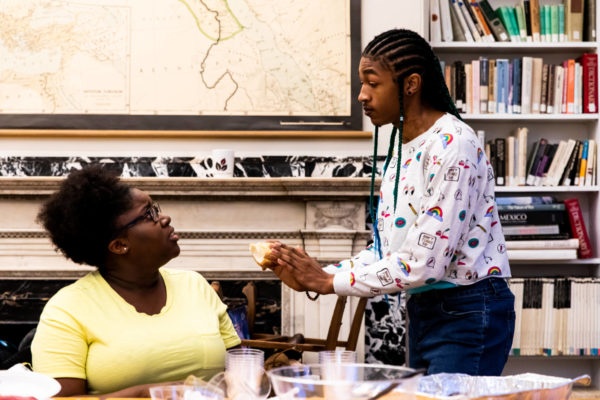
A scene from Company One/A.R.T.’s Greater Good featuring Raijene Murchison and Dev Blair. Photo: Natasha Moustache
• Greater Good (Company One Theater), and Cloud Nine (Nora Theater Company), proving that Boston has world-class theater-makers in its own backyard
• Passengers by Sept Doigts de la Main, proving that modern circuses don’t need spectacle (or animals) to captivate audience members.
• American Utopia, proving that David Byrne at 67 is still a major cultural force with a lot more to say and reveal, and promising that Boston may yet see a comeback as a reliable tryout town for Broadway fare.
• Come From Away, Dear Evan Hansen, and Hello, Dolly!, proving that touring productions can be every bit as good as their Broadway counterparts. (Although the limp Non-Equity production of The SpongeBob Musical showed that there are always cut-rate exceptions)
• Speaking of exceptions, the recent runs at the American Repertory Theater of We Live in Cairo, Six, and Moby-Dick, suggest that A.R.T. artistic director Diane Paulus will continue to play it safe with middle-brow, crowd-pleasing shows, provided that they contain the merest hint of literary, historical, or political significance.
Erik Nikander
The best theater productions I saw this year can be grouped under one thematic umbrella: The old made new. Each of these shows took something from the past and added a healthy dose of the contemporary. Not every attempt to reinvigorate a warhorse of yore turned out to be a success. New Rep’s misguided restaging of the 1969 musical 1776 proved that. Still, a few productions this year managed to join the past and present in ways that kept me riveted.
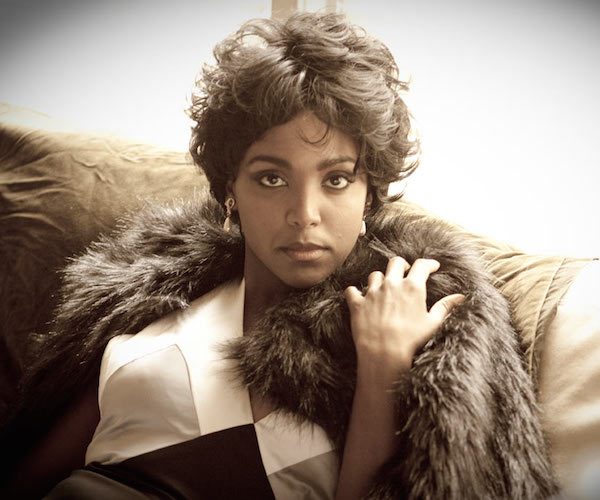
Jade Wheeler play Eartha Kitt in a world premiere Bridge Rep Theatre production. Photo: courtesy of Bridge Rep.
Bridge Repertory Theatre’s production of Who Is Eartha Mae? dramatized the life story of entertainment legend Eartha Kitt by way of a cabaret musical, and the results were exciting. Jade Wheeler’s magnificent performance as Kitt went beyond simple impression or gimmickry, providing a multifaceted portrait of an icon in acting, song, and dance. Not only did the piece highlight the performer’s showbiz talents, it also chronicled her stubborn courage and integrity — qualities more 21st-century entertainers would do well to emulate.
The Huntington Theatre Company mounted two revivals of classics in their 2019-20 season, and both felt exceptionally fresh. Director Peter DuBois’s take on Romeo and Juliet presented Shakespeare’s legendary tragedy via a modern visual style that meshed perfectly with the text’s spirit, elevated even further by the efforts of an excellent ensemble cast. Likewise, Melinda Lopez’s new translation of Yerma perfectly captured the essence of Federico García Lorca’s original while imbuing it with new life — of course, Nadine Malouf’s raw and moving central performance didn’t hurt matters in the slightest.
While the Arlekin Players production of The Stone was remarkable in its own right, it was the company’s richly affecting, meta-textual take on Anton Chekhov’s The Seagull that achieved theatrical nirvana. This production played with the original text in inventive ways that never for an instant felt less than truthful. Director Igor Golyak proved that even an oft-produced classic can surprise — when approached with a nimble sense of creative discovery.
Bill Marx
Here are some of my favorites from the past year. Now that I am teaching fewer courses at Boston University I will be seeing and writing on more theater productions. I am proud to report that none of my selections were expressly groomed for the consumption of tourists visiting Broadway. In fact, transferring the outdoor Double Edge Theatre and Plays in Place productions anywhere else would be impossible. You had to be there and bask in the moment.
And I am sure Taylor Mac’s demand that audience members get up on stage and pair off — men dancing with men and women dancing with women — would not go over well on the Great White Way. Especially given that Mac insists participants grind their bodies together while they sway. You get yelled at if you don’t.
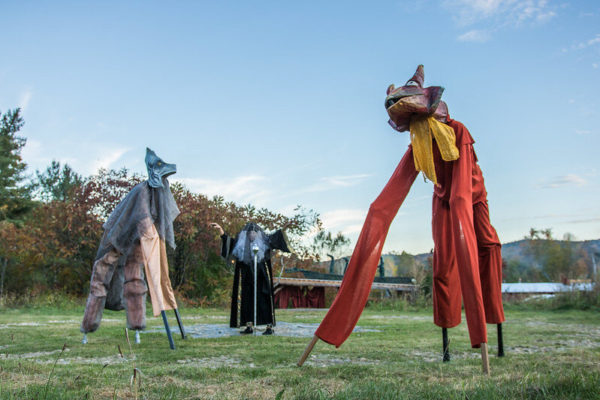
Some of the curious creatures strolling through Leonora’s World.
Leonora’s World, written and performed by Double Edge Theatre. Directed by ringmaster extraordinaire Stacy Klein. The production of the year as far as I am concerned, an epic feast that left nothing out — it overflowed with visual, theatrical, musical, intellectual, and emotional riches. This ambitious recreation of the surreal vision of artist Leonora Carrington was staged throughout Double Edge’s expansive acreage (in Ashfield, MA), involving the talents of a large cast and the antics of some fabulous puppets. The capstone was a stimulating discussion of Carrington’s art at the end of the mind-expanding festivities. As close to Mikhail Bakhtin’s anarchistic vision of carnival as New England is ever going to get.
Taylor Mac: A 24-Decade History of Popular Music (Abridged), co-presented by FirstWorks with the Brown Arts Initiative in Providence, Rhode Island. I read ecstatic critical huzzahs to Mac’s monumental 24-hour-long performance odyssey, a history of American music that ranged from murder ballads to disco and everything in between. So I had to take a look at him when he came to Providence. On the one hand, this “abridged” show was skimpy in terms of musical variety — and for my taste there was too much audience participation. On the other, it was a powerfully entertaining experience, propelled by Mac’s volcanic charisma. And he has political pizazz to spare.
Dear Elizabeth by Sarah Ruhl. At Martha’s Vineyard Playhouse, Martha’s Vineyard, MA. Directed by Joann Green Breuer. Note on conflict of interest: I have known Joann Green Breuer for decades, though it has been a while since I attended a production she directed. Take that connection into account when I call this show one of the best of the year. But, believe me, it was an adroitly modulated dramatization of Ruhl’s selection of letters between poets Elizabeth Bishop and Robert Lowell, beautifully acted by Jeannie Affelder and Raymond Fox. The direction shaped the epistolary exchange into a gripping psychological journey that served the nuanced strengths of a play about art, love, words, companionship, and narcissism.
The End of TV, written and performed by Manuel Cinema, presented by Arts Emerson, Boston, MA. The company continues to wow with its innovative synthesis of puppets, people, and technology. The approach isn’t emptily chic or dehumanizing, as it can be so often, but revelatory. For me, this piece was a Brechtian parable about the value of being hands-on, an homage to the power of making and growing things. (Rather than buying them.) Of course, the show is a celebration of the company itself. In a world obsessed with the “magic” of technology, we watch Manual Cinema meticulously constructing its performances on site.
The America Plays by Patrick Gabridge. Directed by Courtney O’Connor. Staged by Plays in Place at Mount Auburn Cemetery, 580 Mt. Auburn Street, Cambridge, MA. Listening to the dead speak, amid the natural grandeur of Cambridge’s Mount Auburn Cemetery, was a very moving experience.
Tagged: Bill-Marx, Bob Israel, Christopher Caggiano, David Greenham

Prudencia Hart at Apollinaire was, I thought, one of the top 10 productions I’ve seen, not just in the year, but of all time. The script was so innovative, and their execution really made it come alive. I won’t ever hear Kylie Minogue the same way again.